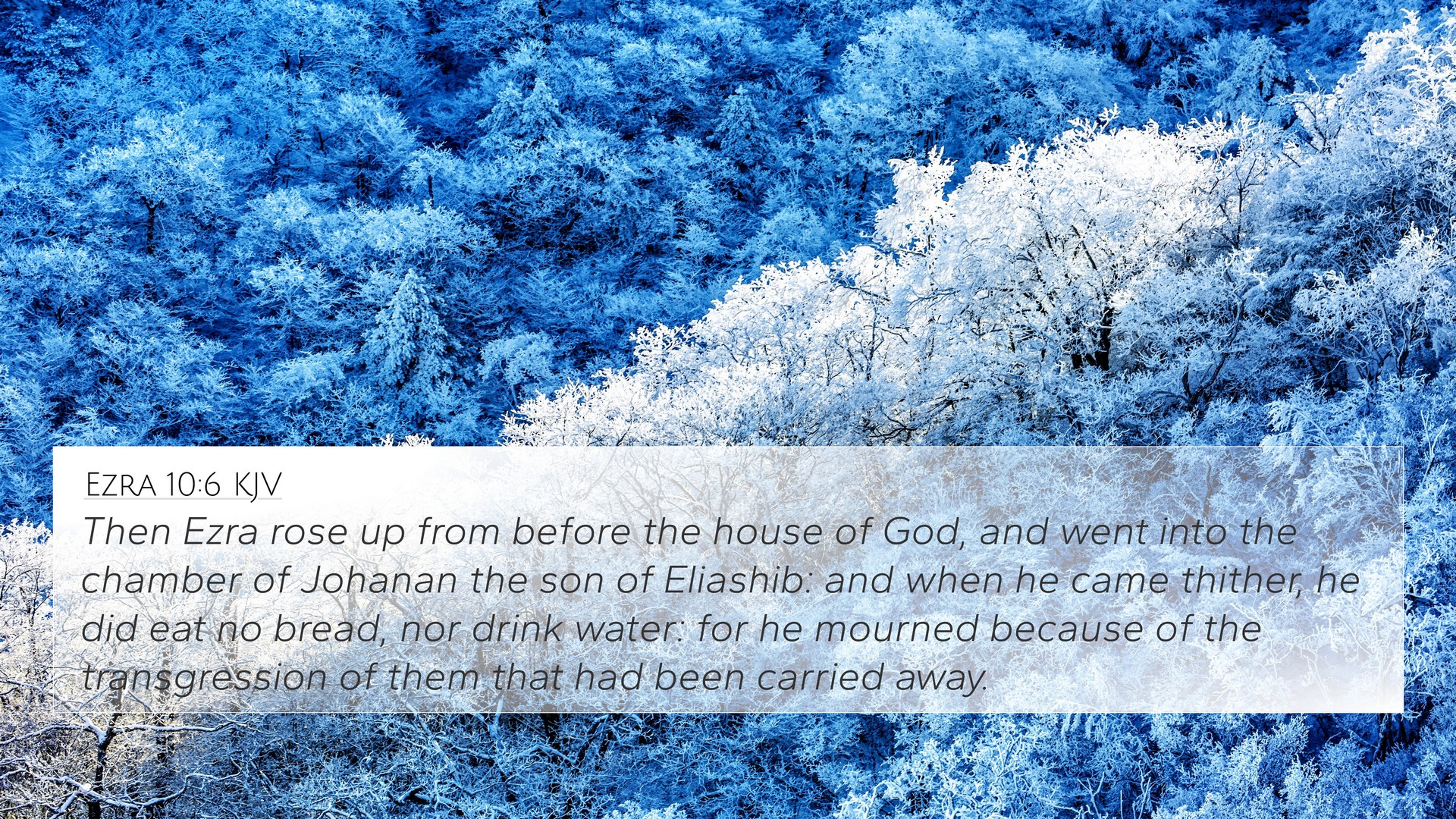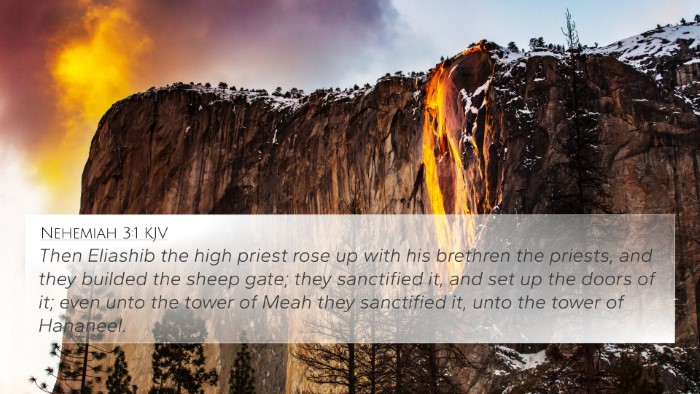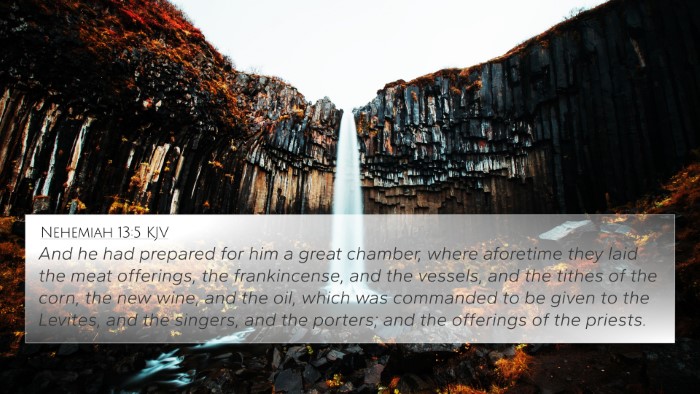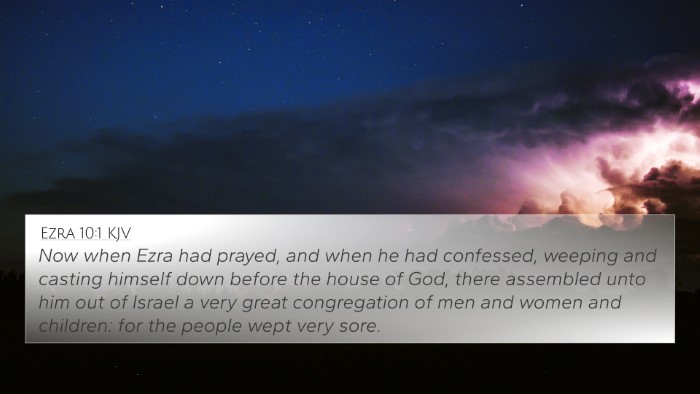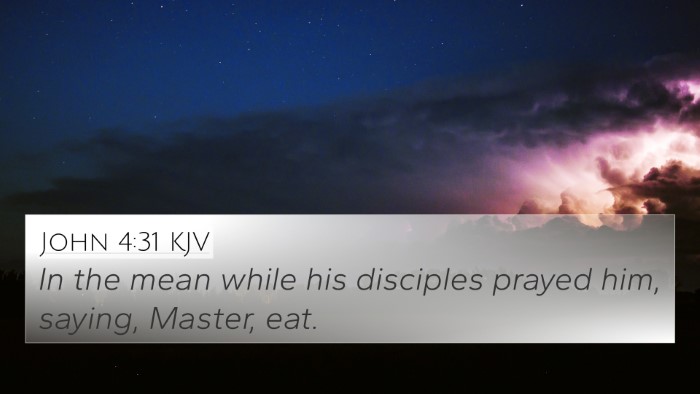Understanding Ezra 10:6
Ezra 10:6 reads: "Then Ezra rose up from before the house of God, and went into the chamber of Jehohanan the son of Eliashib; and when he came thither, he did eat no bread, nor drink water: for he mourned because of the transgression of them that had been carried away." This verse encapsulates a moment of profound sorrow and the weight of spiritual responsibility that Ezra bore as a leader during a pivotal time for the Israelites.
Insights from Public Domain Commentaries
Matthew Henry's Commentary
Matthew Henry emphasizes Ezra's devoutness and the serious nature of the issue at hand. Ezra’s mourning illustrates the gravity of the people's sin, particularly their intermarriage with foreign nations, which was against God’s commandments. His abstaining from food and water symbolizes deep repentance and a fervent plea for God's mercy. Ezra’s actions can be seen as a model for true leadership that prioritizes spiritual integrity over personal comfort.
Albert Barnes' Notes on the Bible
Barnes comments on how Ezra's mourning is not just a personal sorrow but represents a collective grief for the sins of the nation. He notes that Ezra enters a specific chamber, suggesting a separation from the public eye to seek God earnestly. This act demonstrates his commitment to intercede for the people, acknowledging their wrongs and the need for divine intervention. Barnes points out the importance of public leaders actively engaging in spiritual matters and the responsibility they bear for the spiritual wellbeing of their followers.
Adam Clarke's Commentary
Clarke highlights the historical context of Ezra’s actions, noting the significance of his leadership during this return from exile. He explains that Ezra's mourning is tied to the recognition of the serious repercussions of the people's actions, which threatened their covenant relationship with God. Clarke illustrates that this mourning is not a hopeless act but rather a step towards restoration and reconciliation with God through humility and confession of sins.
Cross-References and Thematic Connections
Ezra 10:6 connects with several key Biblical themes and passages. These cross-references enhance our understanding of Ezra's actions and the broader Biblical narrative:
- Nehemiah 1:4: Nehemiah mourns and prays for Jerusalem, showing a parallel in the leaders’ responses to sin.
- 2 Chronicles 7:14: Calls for humility and prayer as a means to heal the land, akin to Ezra’s approach.
- Psalms 51:17: Emphasizes a broken spirit and a contrite heart, which reflects Ezra’s mourning.
- Daniel 9:3: Daniel fasts and prays for his people, mirroring Ezra’s actions in seeking God’s favor.
- James 4:9: Encourages believers to mourn over sin, resonating with Ezra’s expression of grief.
- Isaiah 58:6-7: Discusses true fasting and repentance, paralleling Ezra’s abstaining from food.
- Matthew 5:4: "Blessed are those who mourn," showing Jesus’ teaching on the spiritual value of mourning for sin.
- Hosea 6:1: Encourages return to the Lord, which reflects Ezra's intent in leading the people back to God.
- Acts 3:19: Calls for repentance, echoing the desire Ezra has for the people to turn back to God.
- 1 John 1:9: Emphasizes confession of sins as essential to forgiveness, relevant to the themes in Ezra’s mourning.
The Importance of Contextual Understanding
To fully grasp the meaning of Ezra 10:6, it is crucial to consider the historical and spiritual context of the text. The Israelites faced questions of identity, fidelity to God, and communal integrity after returning from Babylonian exile. Ezra's actions epitomize a heartfelt response to a crisis that affects not just individuals but the entire nation.
Tools for Bible Cross-Referencing
For those looking to delve deeper into the connections between Bible verses, various tools and resources can aid in effective cross-referencing:
- Bible Concordance: A helpful guide for locating words and phrases throughout the Bible.
- Bible Cross-Reference Guide: Systematic tools that organize verses based on themes, concepts, and subject matter.
- Cross-Reference Bible Study: Methods that combine multiple scriptures to provide a holistic understanding of a topic.
- Comprehensive Bible Cross-Reference Materials: In-depth resources designed for serious Bible study.
Conclusion
Ezra 10:6 serves as a profound reminder of the weight of sin within the community and the vital role of leaders in addressing it through repentance and intercession. This passage also illustrates the overarching Biblical theme of redemption and the call to return to God, providing a foundational understanding of spiritual leadership and personal accountability. As readers cross-reference related scriptures, they can gain a richer understanding of biblical teachings and their applications for today.
